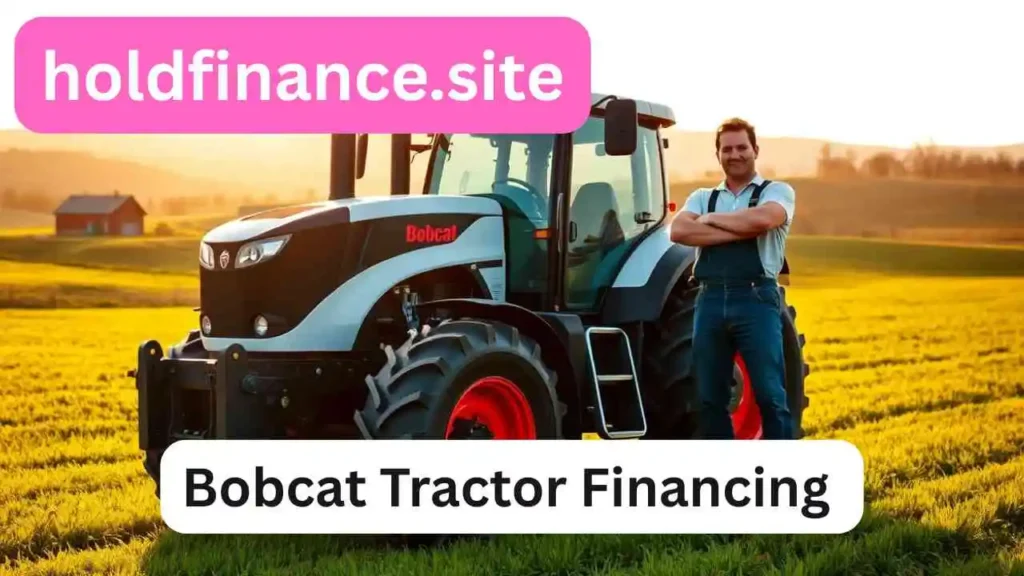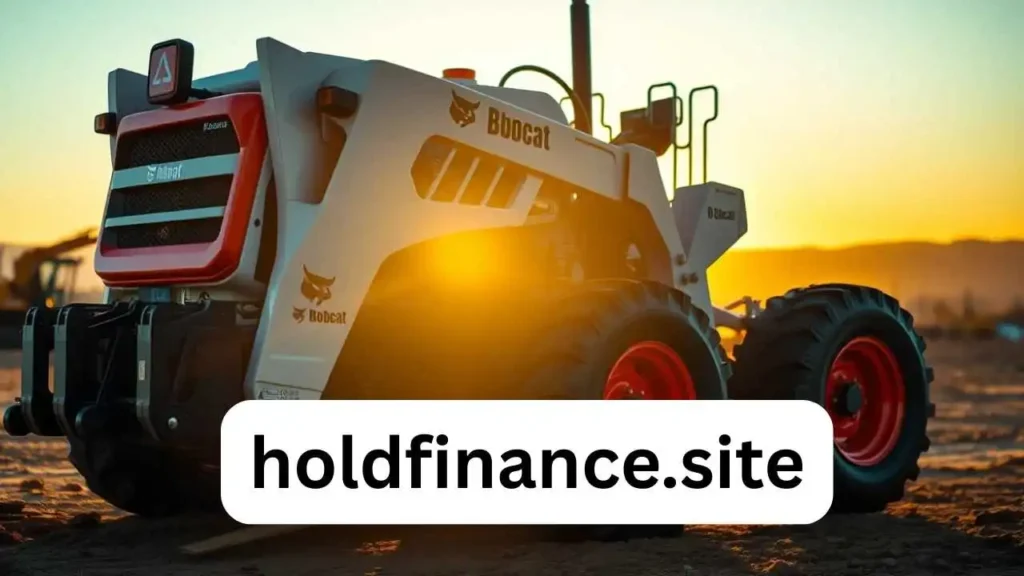Let’s be honest — Bobcat tractors are not cheap. Whether you’re owner of a landscaping business, managing a small farm or just working around the house, owning one of these can really change the game. But the cost up front can be a high hurdle.
That’s where financing steps in like a quiet hero. It’s not just a fallback plan—it might actually be the smartest way to get the equipment you need without draining your bank account. But knowing how to secure Bobcat tractor financing easily? That’s about where most folks start scratching their heads. So, let’s figure this out together.
Table of Contents
How to Secure Bobcat Tractor Financing Easily
Understanding Bobcat Tractor Financing
What Differentiates Bobcat Tractor Financing from the Others
Bobcat Tractor Financing are known for their compact size, transportability, and durable build. They’re machines that are small enough to work in close quarters, but big enough to handle some heavy lifting. If you’ve ever watched one of them in action, you’ve probably noticed how light on its feet it is — sort of like a bulldog in a ballet class. Powerful but nimble.
Popular Models and Their Uses
From the CT1021 for light work to the CT5558 for heavier commercial tasks, there’s a Bobcat tractor Financing to match almost any job. How about clearing a snow-covered driveway? Done. Mow several acres of rough terrain? No problem. Their adaptability makes them especially attractive for owners with diverse needs.

Why Financing Is the Smart Choice
Benefits of Financing Over Cash Purchase
Sure, if you’ve got tens of thousands of dollars that are just sitting around gathering dust, buying outright is easy as pie. But, come on, not everyone does. Financing allows you to spread out the cost over time, leaving your cash free for other purposes — like paying employees, buying materials or leaving the lights on.
Ways in Which Financing Can Help Cash Flow
For small businesses and solopreneurs, cash flow is the lifeblood. Financing allows you to preserve liquidity and keep operations running smoothly. It’s not just about affording the machine—it’s about not stalling your entire business to get it.
Types of Bobcat Tractor Financing Options
Equipment Loans
Straightforward and predictable. You borrow a fixed amount, buy the tractor, and pay it back over time. Interest rates vary, but you own the equipment outright from day one.
Lease Agreements
Leasing gives you access without full ownership. Lower monthly payments, but limited in how you can use or modify the equipment. Excellent for testing the waters or short-term initiatives.
Dealer Financing
Many Bobcat dealers offer financing directly through manufacturers or partner banks. Convenient, yes, but always compare the terms—some might come with higher rates or sneaky fees.
Online Financing Platforms
These are becoming more popular, especially with fast application processes and competitive rates. Think of them as the digital version of shopping around, but from your office chair.
How to Prepare Before Applying
Know Your Credit Score
It’s the first thing lenders will look at. Not sure what yours is? Check it. Better terms and reduced rates are usually associated with higher scores. It’s similar to shaking hands; you want it to be firm.
Gather Your Financial Documents
You’ll need tax returns, bank statements, maybe even a business plan. It’s a bit tedious, but being organized can speed things up and boost your credibility.
Understand Your Budget
Consider more than simply your ability to pay each month. Consider fuel, maintenance, insurance… the whole package. Stretching your budget thin helps no one.
Step-by-Step Guide to Getting Approved
Step 1: Choose the Right Tractor
Get specific. Lenders will want to know what you’re financing, and prices vary widely between models. Pick one that suits your needs—not just your wants.
Step 2: Find a Suitable Lender
Banks, credit unions, dealers, online lenders—explore them all. Each has pros and cons. Some may offer better rates; others, quicker approval.
Step 3: Submit a Strong Application
Accuracy matters. Double-check every detail before you send it off. Incomplete or sloppy applications often get tossed to the bottom of the pile.
Step 4: Review Terms Carefully
Interest rate? Term length? Prepayment penalties? Don’t rush this part. Even a 1% rate difference can cost you thousands over time.
Common Mistakes to Avoid
Ignoring the Fine Print
That “0% interest” offer? It might be for only six months. After that, it balloons. Read the fine print twice if necessary.
Overestimating What You Can Afford
It’s tempting to go big. But stretching yourself too thin can backfire. Choose something that fits comfortably within your means.
Not Comparing Offers
You wouldn’t purchase the first home you saw, would you? Same logic applies here. Always get multiple quotes.
How to Improve Your Approval Chances
Boosting Your Credit
Even just a few months of consistent payments on other debts can bump your score. If your credit is borderline, the wait will be worthwhile.It’s worth the wait if your credit’s borderline.
Offering a Down Payment
Not necessary, but it helps. Even a modest amount can lower your monthly payment and make you more appealing to lenders.
Choosing Shorter Loan Terms
Shorter terms = less interest paid overall. In the long term, you will save money even though the monthly payment will be larger.
What Lenders Typically Look For
Business or Income Stability
They want to know you’ll be able to pay. If you’re just starting out, show contracts or projected income to build trust.
Collateral and Equipment Value
Often, the equipment serves as its own collateral. But lenders still want to ensure it’s worth what you’re borrowing.
Repayment History
A strong history with past loans? Big thumbs up. Be prepared to explain if you’ve failed. Context is essential but it does not need to be a deal breaker.

Dealer vs. Bank Financing: Which is Better?
Dealers can be fast and convenient. Banks may have better rates, particularly if you have a long-time relationship. A one-size-fits-all answer does not exist. Honestly, it might come down to who treats you better or gives clearer terms.
Real Costs Beyond the Monthly Payment
Maintenance and Insurance
A tractor isn’t just a one-time cost. You’ll need to keep it running, insured, and maybe even upgraded over time.
Depreciation Considerations
Tractors lose value, just like cars. Plan for that—especially if you’re thinking of reselling or trading in down the road.
Tips for Negotiating Bobcat Tractor Financing Terms
Ask About Hidden Fees
Processing charges, early payment penalties, documentation fees—they add up. Always ask, “Is this the final number?”
Get Pre-Approved First
It gives you negotiating power and helps you avoid the whole “hoping you’ll qualify” stage.
Leverage Competing Offers
Don’t be afraid to ask, “Can you beat this offer that another lender made to me?” You’d be surprised how often they can.
What to Do If You’re Denied Financing
Reassess and Reapply
Sometimes it’s just bad timing. Fix what you can, then try again in a few months.
Explore Alternative Lenders
Not all lenders judge the same. Some have lower credit ratings or are more accommodating to startups.
Consider Renting Temporarily
If all else fails, renting may bridge the gap. It’s not ideal, but it keeps your business moving.
FAQs
What Credit Score is Required for Bobcat Tractor Financing?
In general, you’ll want at least a 650, though some lenders go much lower (especially if you have good income or collateral).
Can I get Bobcat Tractor financing as a startup?
Yes, but expect to show a solid business plan or future contracts. Startups are riskier, so documentation helps.
Is leasing better than buying for small operations?
It depends. Lower monthly payments but no ownership are what leasing entails. Buying may be better long-term if you plan to use it heavily.
What’s the typical timeline for approval?
With online lenders, it can be as soon as the next business day, while if you apply at a bank, you should receive the funds within the following week, depending on the bank’s document and process time.
Can I refinance my Bobcat loan later?
Yes, especially if your credit improves or rates drop. Just be sure that any refinance fees are outweighed by the savings.
Final Thoughts on a Bobcat Tractor Financing
Getting financed for a Bobcat tractor does not have to be a scary process. As with so many things, it’s a matter of doing a little homework, asking the right questions, and not making up your mind in a hurry. So long as you remain grounded and practical about what you need (and can afford), there’s no reason why you can’t drive away in the machine that makes your job that much easier and your prospects a whole lot clearer.
Read More:
How Does Credit Score Kia Will Finance in 2025
Understanding Fund Finance: Your Essential Guide